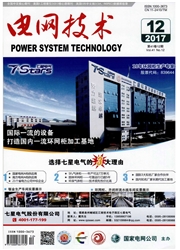

 中文摘要:
中文摘要:
采用理论分析和仿真验证相结合的方法研究了柔性直流配电系统接地方式对其故障特性的影响。首先,介绍了柔性直流配电网的系统架构,确定了直流侧电容的接地方式;其次,分析了直流不平衡电压恢复的理论依据;接着讨论了联接变压器的接地方式对换流器交流侧不同位置单相故障的影响;随后分析了联接变压器接地方式对直流侧单极接地故障的影响,并讨论了不同过渡电阻情况下的故障特性。与电压源型直流输电技术(voltage-sourced converter high-voltage direct current,VSC-HVDC)分析故障特性方法不同,为提高配网供电可靠性,在分析直流侧单极接地故障时,考虑了绝缘栅双极型晶体管(insulated gate bipolar transistor,IGBT)不闭锁的情况。最后讨论了在实际应用中实现IGBT运行在不闭锁状态下的方法。分析结果表明,接地方式对系统的故障过程和故障恢复过程有显著影响。分析方法和结论为柔性直流配网的接地方式选取、保护方案配置提供了参考。
 英文摘要:
英文摘要:
Effect of grounding modes on fault characteristic of flexible DC distribution system(FDCDS) was investigated with both theoretic analysis and simulation. Firstly, FDCDS architecture was presented, and grounding mode of DC side capacitors was determined. Theory about unbalanced voltage recovery was presented, used as theoretical basis for subsequent analysis. Impact of grounding modes of transformer on fault characteristics of AC-side single-phase fault was studied. Then, its effect on DC-side pole-to-ground fault was analyzed, and fault characteristic for different fault resistances was discussed. Unlike analytic methods used in VSC-HVDC projects, in order to improve power supply reliability in FDCDS, IGBT block was not applied in fault analysis of DC-side pole-to-ground faults. Finally, methods of ensuring IGBT work under unblocked condition were discussed. Results show that system grounding mode has a great influence on fault characteristics and restoration procedure. It also provides reference for selecting grounding modes and deciding protection configuration.
 同期刊论文项目
同期刊论文项目
 同项目期刊论文
同项目期刊论文
 期刊信息
期刊信息
